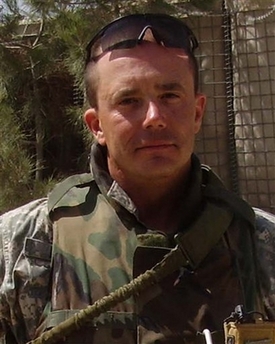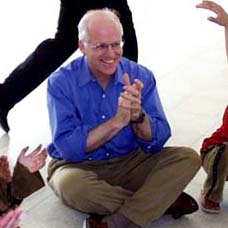
Paul, 43, of Hammond, Ind., had more experience than the rest. An urban planner and a Peace Corps veteran, he had volunteered to spend all of 2004 in Iraq on a provincial reconstruction team. Paul embraced civil affairs and all that it meant. He died with about $800 in his pocket, a sum that was to have bought a set of false teeth for the mayor of Mehtarlam. On missions in Afghanistan, Paul was the driver and Howard was the gunner, standing on the box to make up for her height, about 5-foot-4. For Afghans in this conservative tribal area, where most women wear burqas that cover everything, it must have been a bizarre sight: a gray-haired woman in a helmet on top of a Humvee. "That's why Sgt. Howard loved the turret," said Air Force Senior Airman Brenda Patterson, 26. "She wanted to give little girls dreams of their own."
Merideth Howard and Bob Paul made a supply run to a U.S. military base near the Afghan capital. They never made it back, dying in a fiery suicide bombing in Kabul on Sept. 8.
She was 52 when Afghan bomb struck: Merideth Howard, the oldest known woman to die in combat, was behind the gun of a Humvee
(Chicago Tribune (KRT) Via Thomson Dialog NewsEdge) Sep. 24--MEHTARLAM, Afghanistan -- The older soldiers called themselves the Gray Brigade, but Sgt. 1st Class Merideth Howard never talked about her age. Soon, no one asked.
In training, the Waukesha, Wis., resident ran as hard as men much younger. She became a gunner on a Humvee at this small military base, building a wooden box to stand on so she could see over the turret.
Her last night here, Howard and Staff Sgt. Robert Paul sat on the back stoop of their barracks with the base cook, as usual.
"We started talking about the time she got shot at," said Air Force Tech. Sgt. Marlin McDaniel, 42, the cook. "I said I'd probably duck. I wouldn't know what to do. But they both basically said at the same time, 'When it's your time to go, it's your time to go.'"
The next day, Howard and Paul made a supply run to a U.S. military base near the Afghan capital. They never made it back, dying in a fiery suicide bombing in Kabul on Sept. 8.
At 52, Howard, who had gray hair and an infectious smile, became the oldest known American woman to die in combat.
The fact that she was even here, serving as a gunner on a Humvee, shows the drain that two wars have put on an all-volunteer military. She was the new face of the military's civil affairs units, which do reconstruction and relief work. Constant deployments have tapped out the regular Army Reservists who most often filled those jobs in Iraq and Afghanistan.
Howard never had been deployed before, not since joining the Reserves on a whim in 1988. After her medical unit was disbanded in 1996, she was assigned to the Individual Ready Reserves, for soldiers without a unit. She still went to monthly drills but mainly handled paperwork, biding her time, putting in her 20 years before earning retirement benefits.
But as a stopgap--and in a first for the U.S. military--provincial reconstruction teams in Afghanistan were being filled by a mix of Navy, Air Force, Army, National Guard and Reserve soldiers. And many in the Reserves were like Howard, in the Individual Ready Reserves, home also to retired soldiers who had recently left the Army. A few regular reservists, such as Paul, volunteered for civil affairs. The rest, such as Howard, were called up last December.
"We were a little surprised," said Master Sgt. Robyn Fees, 50, who became a close friend of Howard's after the two were called up. "We didn't even know what 'civil affairs' was, to be honest with you."
Howard was a no-frills woman, more comfortable pounding a hammer than wearing a dress, those who served with her said. In Afghanistan, she often visited the base area known as Home Depot, where the wood was stored, and built herself a rudimentary armoire and a side table. Her hammer still sits in her room on base. An unfinished picture frame, made from Afghan carved wood she bought at a local bazaar, waits on her desk.
She was used to challenges. Born and raised in Corpus Christi, Texas, Howard wanted to be a firefighter, but her hometown did not hire women. So in 1978 she joined the department in Bryan, Texas, as its first female firefighter. She later became a fire risk-management specialist with insurance companies, eventually helping set up a consulting company in California.
In 1991, Howard started dating Hugh Hvolboll, who made fireworks for a living. "You set them off, and I'll decide how much damage they cause," Howard would joke. In 2004 the couple moved to Waukesha for his job. They never felt the need to get married, not until she was called up in December. Slightly nervous, Howard wanted to make their relationship official.
"As a boyfriend, I would have no status with the Army," Hvolboll said. "As a husband, I did."
In late April, the nine members of Howard's civil affairs team arrived at the Mehtarlam base in eastern Laghman province. They formed the core of the provincial reconstruction team.
Paul, 43, of Hammond, Ind., had more experience than the rest. An urban planner and a Peace Corps veteran, he had volunteered to spend all of 2004 in Iraq on a provincial reconstruction team.
Paul embraced civil affairs and all that it meant. He died with about $800 in his pocket, a sum that was to have bought a set of false teeth for the mayor of Mehtarlam.
Civil affairs is not a new concept for the U.S. military, but provincial reconstruction teams are. The first team began its work in Afghanistan in 2003, a calculated attempt to try to fight the Taliban by helping Afghans rebuild. Almost immediately, the teams became controversial. Aid agencies accused the teams of blurring the line between the military and aid, possibly endangering traditional relief workers.
But the teams spread to Iraq, and throughout Afghanistan. There are now 24 provincial reconstruction teams here, and a 25th is being set up in eastern Nuristan province.
It is not easy work. Almost 30 years of war have destroyed any professional class in Afghanistan. There are few engineers, architects, doctors or teachers. Achieving anything here takes many attempts. Hospital Road in Mehtarlam, for example, will soon have to be redone for the third time.
On a mission by Howard's unit here last week--the first since she and Paul were killed--Capt. Walter Christian, 36, visited the town's power plant project. Once finished, 800 of the 2,000 homes in town should have power. But the director of the plant mistakenly planned to install the wrong kind of wire. And the old engineer had suddenly left.
"That's pretty much a problem," said Christian, an Army Reservist, shaking his head.
At the new public-safety building, workers did not put enough mortar between the bricks. The stairs were a mess.
The soldiers tried to visit the orphanage, their third attempt. But again, no one showed up at the governor's office to help them find it.
In May, Howard was filmed for a U.S. military video highlighting reconstruction work. She is serious, with no evidence of her normal laugh. She stands in a village near the Mehtarlam base, the wind blowing through her hair, her face pink from the hot sun, just after handing out backpacks to kids.
"We have a good relationship with the people here in the village," she says. "And of course, as [with] everybody in Afghanistan, they are in need."
At first, Howard handled paperwork at the base, tracking projects and applying for money. She was good but longed to be off the base, to go on missions, to be out with the Afghan people. She wanted to be a gunner.
"She wanted to do everything," said Air Force Tech. Sgt. Felicia Mason, 37, who later became Howard's roommate. "She wanted to be able to excel in everything. Because she didn't want anyone to say she couldn't do it because she was a woman."
Howard got her chance. The civil affairs team of nine shrank. One soldier went home after a non-combat injury, another was sent to Nuristan, and the gunner to Jalalabad.
One video shows Howard training on an automatic grenade launcher. She stands on a box inside the turret, trying to squeeze the triggers. "See what you mean, ma'am," she says to 1st Lt. Bernice Logan, an Army Reservist, who had told her the triggers were tough. The trainer tells Howard she might want to put the gun on "fire" and remove the safety. Howard laughs. "That could be the problem."
Howard told a cousin back home she was surprised at what she was doing. She told her husband that one day she realized she enjoyed it. In August, she told Christian she was thinking of extending her tour.
"Merideth liked to live life as an adventure," her husband said.
According to Pentagon policy, women are excluded from serving in combat units, though in the chaotic realities of Iraq and Afghanistan, their support roles have grown ever closer to the front lines.
Howard's death makes her the oldest U.S. servicewoman known to have died in combat, said Judy Bellafaire, chief historian at the Women in Military Service for America Memorial Foundation near Arlington National Cemetery. A 52-year-old nurse died in Vietnam, but from a stroke, she said. Even so, there still was some uncertainty. Records for World War II and earlier conflicts often omit ages.
On missions in Afghanistan, Paul was the driver and Howard was the gunner, standing on the box to make up for her height, about 5-foot-4. For Afghans in this conservative tribal area, where most women wear burqas that cover everything, it must have been a bizarre sight: a gray-haired woman in a helmet on top of a Humvee.
"That's why Sgt. Howard loved the turret," said Air Force Senior Airman Brenda Patterson, 26. "She wanted to give little girls dreams of their own."
The supply run to Bagram Air Base, north of Kabul, happened every month or two. On this trip, the soldiers picked up mail, ammunition, supplies and three new Humvees, with adjustable platforms for the gunner.
For the first time, Howard would not need her wooden box.
On that Friday morning, Sept. 8, the convoy of five Humvees left base. Paul and Howard were alone because they planned to pick up two other people at the U.S. Embassy in Kabul. At Camp Phoenix, just outside Kabul, the soldiers dropped off one Humvee with transmission problems and a second Humvee pulling a trailer of ammunition.
The other three vehicles made their way down Jalalabad Road, Kabul's suicide bomb alley. The convoy headed for the embassy.
A Lexus SUV pulled up behind the third Humvee. A blue Toyota Corolla followed the Lexus. Witnesses said the Corolla tried to pass the Lexus on the left. But the Lexus blocked the Corolla and started trying to pass the convoy on the left.
The gunner on the third Humvee told soldiers after the attack that he was focused on the Lexus, warning it to stop.
But at the same time, the blue Corolla moved up on the right. One soldier in the third Humvee saw the back of the driver's head, his blue shirt. Another soldier noticed the brake lights.
And they all watched as the car swerved into the second Humvee, bounced off, and then swerved in again. Everything seemed slow, the soldiers said, slow enough to notice the driver's face as he pulled in the last time--his mustache, no beard. And then a loud explosion, and a flash, and everything was on fire. The blast left a 6-foot-wide crater in the road, killing at least eight Afghans.
The soldiers hoped for survivors in the second Humvee, that somehow no one had died. But the medic never even got to open his bag. Howard and Paul, who did most things together on the base, who always referred to each other politely by rank and last name, were killed in the same instant.
kbarker@tribune.com
jjanega@tribune.com
Kim Barker reported from Mehtarlam and James Janega from Waukesha
Copyright (c) 2006, Chicago Tribune
Distributed by McClatchy-Tribune Business News.
















